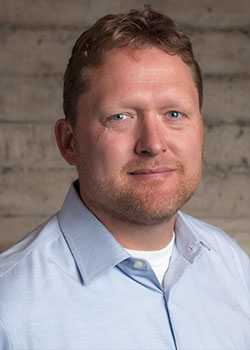
By:
- Erika Johnson
Published Date
By:
- Erika Johnson
Share This:
Cognitive Science Alumnus Chris Fry Leads Twitter to New Heights

Chris Fry
It is Chris Fry’s job, as senior vice president of engineering at Twitter, to make sure his flock of engineers continues to fly in formation. Fry is an expert engineer whose team does a number of things, including making sure Twitter can handle more than 500 million daily Tweets. Yet it is his ability to build and manage innovative teams that makes him one of the most valuable technology leaders in the business today. Fry credits his versatility to the interdisciplinary education he gained while pursuing a Ph.D. in cognitive science at UC San Diego — a path that while maybe not an obvious choice for his field, has proven invaluable.
“Cognitive science, coupled with a minor in computer science, effectively prepared me for a career in technology leadership,” said Fry. “Throughout my academic and professional career I’ve maintained a broad spectrum of interests grounded in technology.”
Fry’s fascination with computers and user experience began at age 13. Dissatisfied with the functionality of a keyboard, he set out to write software to enable computers to understand language. His interest in how the mind processes language extended into college and his postdoctoral research, where he studied how birds learn to communicate through song, or “tweets.” It is mere coincidence that he ended up at a leading technology corporation specializing in a different kind of “tweet.”
“I never thought a Ph.D. in birdsong would be relevant to my career, but now I can understand all of the conference room names at Twitter headquarters,” said Fry.
Joking aside, Fry returned to UC San Diego recently to speak to a group of prospective cognitive science graduate students about just how significant his background in the social sciences proved to be. Fry’s unique edge comes from his ability to understand people—their motivations, perceptions and behaviors—and the networks in which they interact. By gaining a fundamental understanding of how neurons transmit information in the brain along complex circuit lines, Fry is able to apply the same principles to building complex scalable systems.
“In the technology field, there can be a gap between those who understand the technical aspects and those who understand people, and bridging this gap is a fundamental problem,” said Fry. “You must have a clear sense of the individuals that make up the network in order to move the company forward as a whole.”
An interdisciplinary field combining studies of the brain, human behavior and computation, cognitive science equips students with diverse knowledge: from linguistics to philosophy and psychology to neuroscience. According to Fry, philosophy is underrated in leadership. Thinking and talking about abstract ideas and debating principles of human nature provided him with the ability to communicate and reconcile team ideas with leadership expectations. It also taught him to appreciate differences of opinion and value the chance to work with individuals stemming from other fields.
“Engineering degrees prepare you to get the right answer,” said Fry. “However, when thinking about scaling teams, there is often not a definite or right answer. Often the outcome of research is more research. Yet, at a certain point, you have to know when to move forward, even if there is no obvious pathway.”
When he first began his Ph.D. program, Fry initially sought a career in academia. As a laboratory assistant for Edwin Hutchins, a MacArthur Award-winning UC San Diego professor of cognitive science, Fry was exposed to new coding techniques and the diverse research of other graduate students. He also relished the one-on-one insight gained from conversations with one of his advisors, Jeff Elman, a UC San Diego professor of cognitive science and dean of the Division of Social Sciences who counseled Fry during his dissertation. Sustaining a love of learning, Fry has brought this same mentorship model to Twitter, where he ensures his team has freedom to innovate and is encouraged to experiment.
To support this paradigm and strengthen organizational efficiency, Fry launched Twitter University last year. At the in-house learning center, Twitter staff are invited to diversify their skills and bridge departmental knowledge by enrolling in technical classes, many taught by peer experts.
“What makes people happy at work? Autonomy, mastery and purpose,” said Fry. “That’s why we started Twitter University—when team members develop a sense of expertise, it makes the organization stronger as a whole.”
During his talk, Fry counseled students to take advantage of their time in graduate school. Although he only spent four years at UC San Diego, he explained that it was one of the most impactful times of his life—from surfing in the morning at La Jolla Shores to collaborating with other brilliant minds and having the freedom to deeply engage with a topic of interest.
“I love UC San Diego; it is an incredibly special place,” said Fry. “My time here influenced my life immensely—being able to work on problems, have meaningful discussions with my professors and peers—it was one of the best times in my life.”
To keep up with Fry on Twitter, follow him @chfry.
Share This:
You May Also Like
Stay in the Know
Keep up with all the latest from UC San Diego. Subscribe to the newsletter today.


